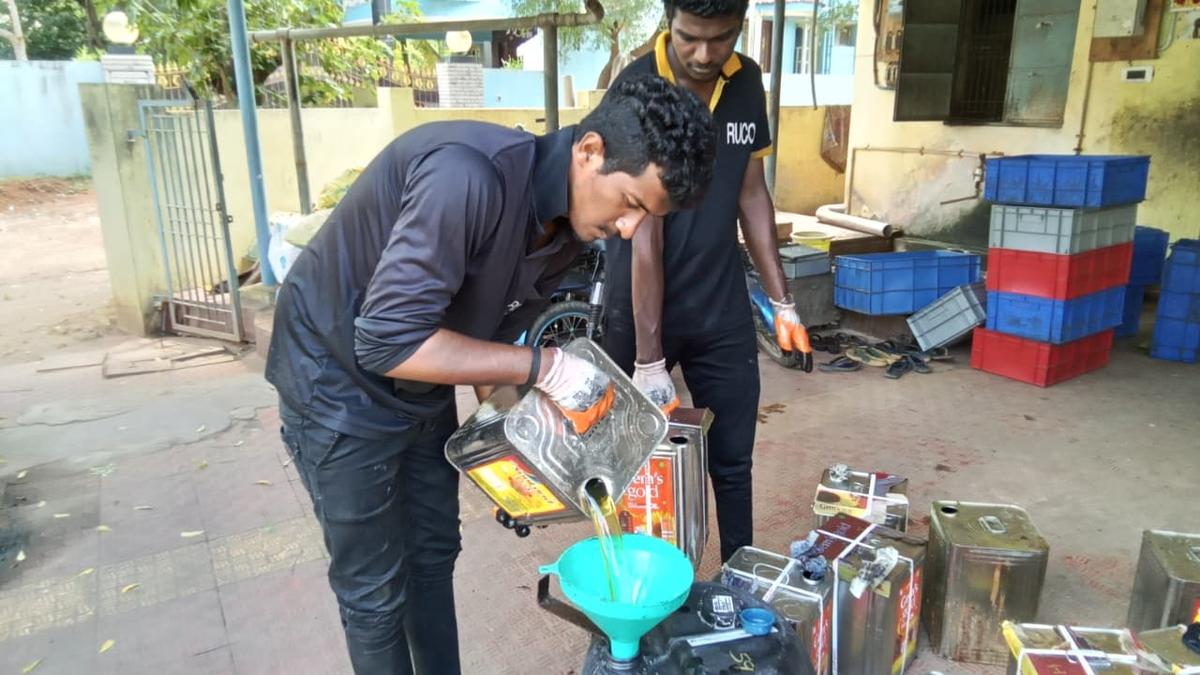Science
FSSAI’s Used Cooking Oil Initiative Gains Momentum in Tamil Nadu

The initiative to convert used cooking oil into biofuel, launched by the Food Safety and Standards Authority of India (FSSAI), has seen a significant increase in participation across several districts in Tamil Nadu. Known as the Repurpose Used Cooking Oil (RUCO) initiative, this program aims to collect used oil from food manufacturers and repurpose it as sustainable energy, particularly as the festive season approaches.
In the lead-up to Deepavali, the initiative has notably gained traction in regions such as Tiruchi, Dindigul, Pudukottai, Thanjavur, Tiruvarur, Nagapattinam, and Mayiladuthurai. The kB Energy Corporation, a start-up based in Tiruvanaikovil and licensed by the FSSAI, collects used oil from over 2,000 food establishments. Currently, they report having nearly 30 tonnes of used oil ready for processing, a remarkable increase compared to their usual collection of 15 to 20 tonnes per month.
According to Kishore Kumar Baskaran, the founder of kB Energy Corporation, food vendors, especially those selling deep-fried snacks, can use up to 50 litres of oil daily. Larger companies may consume up to 100 litres. FSSAI guidelines stipulate that at least 20 to 25% of this oil can be diverted for biofuel production, contributing to a more sustainable energy landscape.
Economic and Health Benefits of the Initiative
The collection of used cooking oil has not only become a competitive venture but has also created job opportunities for young entrepreneurs in the area. Kishore noted that there is an increasing awareness surrounding the health risks associated with reusing cooking oil, which can lead to serious health issues. As a result, food vendors are now more inclined to sell their used oil rather than reuse it multiple times.
Once collected, the used oil is meticulously filtered and stored in large barrels and tanks at the company’s facility in Tiruvanaikovil. The company is authorized to supply this oil only to licensed biofuel manufacturers, adhering to regulations set forth by the FSSAI and the Biodiesel Association of India. Kishore remarked on the dangers posed by unlicensed operators who may resell used cooking oil to smaller restaurants for reuse, emphasizing the importance of consumer education regarding food safety.
Consumer Safety Measures and Compliance
As the festive season approaches, the district administration is advising consumers to purchase sweets and snacks from vendors who comply with FSSAI standards and hold a valid Hygiene Rating Certificate. An official advisory issued recently stated that vendors operating without this certification would face legal repercussions.
Consumers are encouraged to report any food-related complaints via a dedicated WhatsApp number, 9444042322, or through email at [email protected]. Complaints can also be lodged using the TN Food Safety Consumer App or through the Food Safety Connect platform. More detailed grievances can be recorded online at https://foscos.fssai.gov.in, ensuring that food safety remains a priority during this festive period.
The RUCO initiative represents a significant step towards both environmental sustainability and public health, highlighting the importance of responsible practices in the food industry. As awareness grows, the collaboration between consumers, businesses, and regulatory bodies could pave the way for a healthier and more sustainable future.
-

 World5 months ago
World5 months agoSBI Announces QIP Floor Price at ₹811.05 Per Share
-

 Lifestyle5 months ago
Lifestyle5 months agoCept Unveils ₹3.1 Crore Urban Mobility Plan for Sustainable Growth
-

 Science4 months ago
Science4 months agoNew Blood Group Discovered in South Indian Woman at Rotary Centre
-

 World5 months ago
World5 months agoTorrential Rains Cause Flash Flooding in New York and New Jersey
-

 Top Stories5 months ago
Top Stories5 months agoKonkani Cultural Organisation to Host Pearl Jubilee in Abu Dhabi
-

 Sports4 months ago
Sports4 months agoBroad Advocates for Bowling Change Ahead of Final Test Against India
-

 Science5 months ago
Science5 months agoNothing Headphone 1 Review: A Bold Contender in Audio Design
-

 Top Stories5 months ago
Top Stories5 months agoAir India Crash Investigation Highlights Boeing Fuel Switch Concerns
-

 Business5 months ago
Business5 months agoIndian Stock Market Rebounds: Sensex and Nifty Rise After Four-Day Decline
-

 Sports4 months ago
Sports4 months agoCristian Totti Retires at 19: Pressure of Fame Takes Toll
-

 Politics5 months ago
Politics5 months agoAbandoned Doberman Finds New Home After Journey to Prague
-

 Top Stories5 months ago
Top Stories5 months agoPatna Bank Manager Abhishek Varun Found Dead in Well









